Professor Navin Ramankutty Awarded the Wihuri International Prize
UBC Professor Navin Ramankutty — of the Institute for Resources, Environment and Sustainability and the School of Public Policy and Global Affairs — has been awarded the prestigious Wihuri International Prize in recognition of his long-standing work on sustainable global food systems.
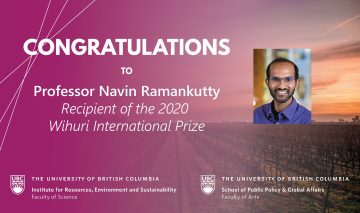
As Canada Research Chair in Global Environmental Change and Food Security, Ramankutty is a leading researcher in global sustainable land use and food systems. His research uses global data and models to understand how humans use and modify the Earth’s land surface for agriculture, to evaluate resulting global environmental consequences, and to explore solutions to the problem of improving food security with minimal environmental footprint.
In the last decade, Ramankutty’s research focused on the challenge of feeding a growing global population in ways that are more environmentally sustainable and climate resilient. He was part of the team that published a study in 2011 proposing four major solutions to achieving a doubling of available food calories while reducing agriculture’s environmental footprint.
Speaking to his process, Ramankutty said that “science is always iterative.”
“You work on what is the weakest link at that point. Ten years or twenty years ago, the weakest link was the dataset itself, so I started building global datasets of agricultural land use. While doing that, I became interested in this whole problem of food. The reason that we’re using all this land is for agriculture but that fact has all these huge environmental implications. So [my work is in] trying to understand the trade-offs: on the one hand we need food, on the other hand we have these environmental problems.”
Assessing trade-offs is also a component of Ramankutty’s work in examining the balance between biodiversity conservation and food production. In other research, he and colleagues estimated the potential impacts of climate change and extreme weather events on crop production. Along with his students, Ramankutty explores the sustainability outcomes associated with organic agriculture, urban agriculture, and small farms.
For his aforementioned contributions, Ramankutty has been awarded the 20th Wihuri International Prize by The Wihuri Foundation for International Prizes, a private institution based in Helsinki, Finland. Founded in 1953 by Finnish industrialist and sea captain Antti Wihuri, its purpose is to promote and sustain the cultural and economic development of mankind by awarding international prizes. During the past decade, the prize was awarded, for example, to researchers in the fields of atmospheric science, peace research and bioeconomics.
“The prize is really a testimony to the importance of sustainable global food systems,” said Ramankutty. “It honors all the people who work in the same field.”
The awarding process involved an eight-membered Board of Trustees selecting a topic — in 2020, they chose the global food system. It then appointed an expert committee that suggested three proposals for the recipient of the prize. The board made a unanimous decision of choosing Ramankutty as the recipient of the 2020 Wihuri International Prize.
“The Wihuri International Prize was awarded to Navin Ramankutty as a recognition of his outstanding scientific track record. In addition, we at the Wihuri Foundation for International Prizes want to highlight the urgency for sustainable solutions to the ways we produce food for the growing number of people on our planet,” said Erkki KM Leppävuori, the chairman of the Board of trustees.
The Wihuri Sibelius Prize, awarded to composers, and the Wihuri International Prize, awarded to scientists, are both worth 150 000 euros (about 235 000 Canadian dollars) and are given out, as a rule, at least every three years. This year, the Wihuri Sibelius Prize was awarded to Finnish composer Jukka Tiensuu. The Prizes were awarded in a small awarding ceremony in Helsinki, Finland on October 9th, 2020. Ramankutty attended the awarding dinner virtually and held a presentation on his research topics. In normal circumstances, the Foundation would have organized an awarding ceremony with over 800 guests. The Foundation and Ramankutty are planning his potential visit to Helsinki in 2021, bearing in mind the Covid-19 situation.
Original post written by Lindsay Marsh, SPPGA
Camera traps show effects of outdoor recreation on B.C. wildlife
In southwestern B.C., all wildlife tend to avoid places that were recently visited by humans even if the recreational activity doesn’t involve motorized vehicles. This finding comes from a new study by IRES’s Robin Naidoo and Cole Burton in UBC Forestry, which was featured in UBC Science News, News 1130, CTV, CTV Vancouver and Radio Canada.
Expert Opinion: The Right To Breathe Clean Air
In the recovery from this pandemic, leaders gathering at the United Nations have the opportunity and duty to “simultaneously tackle the deadly pollution and work to achieve everyone’s right to breathe clean air,” urges IRES prof David Boyd. Boyd is the United Nations Special Rapporteur on human rights and the environment, and presented a report on air pollution to the Human Rights Council in 2019.
City Bar Association Urges UN to Formally Recognize Human Right to a Healthy Environment
The New York City Bar Association, a group of over 24,000 lawyers and law students, joins IRES prof David Boyd in pushing the United Nations to recognize the human right to a healthy environment by the end of this year. Among specifically listed goals, the bar association calls on the U.S. permanent representative to the U.N. to support these matters in the General Assembly.
People don’t really grasp how their actions impact climate, study shows
A study led by IRES prof Jiaying Zhao and Simon Donner & Seth Wynes of UBC Geography looked at how well people understand the climate impact of individual actions. Unfortunately, balancing a carbon budget is not intuitive for most people. Consumers struggle to make tradeoffs between sets of different actions that impact climate.
December 3, 2020: IRES Faculty Seminar with Inês Azevedo (Last Seminar in Term 1)
IRES Seminar Series
Time: 12:30pm to 1:30pm (every Thursday)
Via Zoom
View video
*********************************************************************************
Transitioning to sustainable energy systems while considering environmental justice and distributional effects
In this talk I will cover three related recent papers:
1) Comparing the Health Damages from Air Pollution to the Value Added in the U.S. Economy (PNAS, 2019): We use integrated assessment models to compute economy-wide gross external damages (GED) due to premature mortality from air pollution. We note 4 key findings: First, economy-wide, GED has decreased by more than 20% from 2008 to 2014. Second, while much of the air pollution policies have focused to date on the electricity sector, damages from farms are now larger than those from utilities. Third, 4 sectors, comprising less than 20% of the national GDP, are responsible for ∼75% of GED attributable to economic activities. Fourth, uncertainty in GED estimates tends to be high for sectors with predominantly ground-level emissions because these emissions are usually estimated and not measured.
2) Fine Particulate Air Pollution from Electricity Generation in the US: Health Impacts by Race, Income, and Geography (ES&T, 2019): Electricity generation is a large contributor to PM2.5 air pollution. However, the demographic distribution of its resulting exposure is largely unknown. We estimate the health effects from air pollution from electricity generation in the US, for each of the seven Regional Transmission Organizations, for each US state, by income and by race. Exposures are higher for lower-income than for higher-income, but disparities are larger by race than by income. Geographically, we observe large differences between where electricity is generated and where people experience the resulting air pollution health consequences: for 36 US states, most of the health impacts are attributable to emissions in other states.
3) What are the best combinations of fuel-vehicle technologies to mitigate climate change and air pollution effects across the United States? (ERL, 2020) The transportation sector is the largest contributor to greenhouse gas emissions (GHGs) and a major source of criteria air pollutants in the U.S. Spatially explicit evaluations of the effectiveness of alternative fuels and advanced vehicle technologies in mitigating both climate change and air pollution are lacking. In this work, we estimate the life cycle monetized damages due to GHGs and criteria air pollutant emissions for different types of passenger-moving vehicles in the U.S. We find substantial spatial variability in the monetized damages for all fuel-vehicle technologies studied. None of the fuel-vehicle technologies leads simultaneously to the lowest climate change damages and the lowest air pollution damages across all U.S. counties. Instead, the fuel-vehicle technology that best mitigates climate change in one region is different from that for the best air quality.
Inês Azevedo
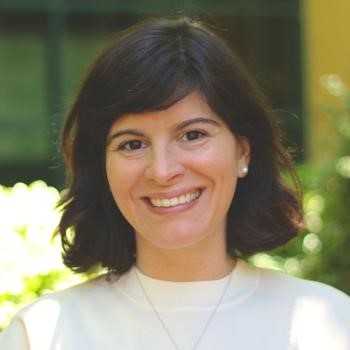
Associate Professor, Department of Energy Resources Engineering, Stanford University
Bio:
Inês M.L. Azevedo is Associate Professor in the Department of Energy Resources Engineering at Stanford University. She also serves as Senior Fellow for the Woods Institute for the Environment and is an Senior Fellow with the Precourt Energy Institute at Stanford University. Prior to that, she served as full Professor in the Department of Engineering and Public Policy at Carnegie Mellon University, where she co-led the Climate and Energy Decision Making Center. Dr. Azevedo’s research interests focus on how to transition to a sustainable, low carbon, affordable and equitable energy system. She focusses on issues where a systems approach is needed, by combining engineering and technology analysis with economic and decision science approaches. She has published 90+ peer-reviewed publications and she has participated as an author and committee member in several National Research Council reports from the U.S. National Academy of Sciences. She is now participating in the IPCC AR6 as one of the lead authors for the Energy chapter. Dr. Azevedo has received the World Economic Forum’s “Young Scientists under 40” award in 2014, and the C3E Women in Clean Energy Research Award in 2017.
November 26, 2020: IRES Professional Development Seminar with Cicely Blain
IRES Seminar Series
Time: 12:30pm to 1:30pm (every Thursday)
Via Zoom
This seminar will not be recorded.
*********************************************************************************
Workshop in Anti-Racism and Implicit Biases
The workshop will be tailored to anti-racism and implicit biases in our personal and professional life.
Cicely Blain
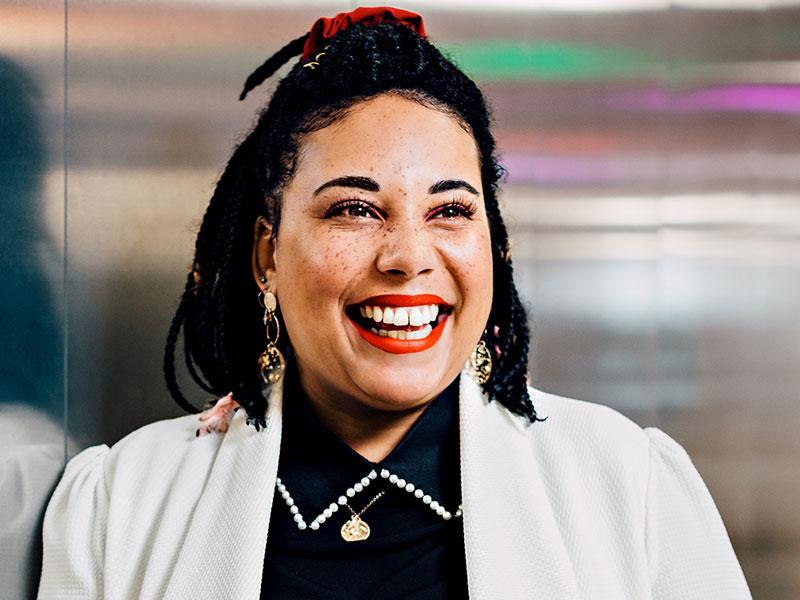
CEO, Cicely Blain Consulting
Bio:
Cicely Belle Blain is a Black/mixed, queer femme from London, UK now living on the lands of the Musqueam, Squamish and Tsleil-Waututh people. Their ancestry is a mix of Gambian (Wolof), Jamaican and English. At the heart of all their work, Cicely Belle harnesses their passion for justice, liberation and meaningful change via transformative education, always with laughter, and fearlessly in the face of systemic oppression.
They are noted for founding Black Lives Matter Vancouver and subsequently being listed as one Vancouver’s 50 most powerful people, BC Business’s 30 under 30 and one of 150 Black women and non-binary people making change across Canada. They are now the CEO of Cicely Blain Consulting, social justice-informed diversity and inclusion consulting company with over 200 clients across North America, Europe, Asia and Africa.
Cicely Belle is an instructor in Executive Leadership at Simon Fraser University and the author of Burning Sugar (Arsenal Pulp Press, 2020).
November 19, 2020: IRES Faculty Seminar with Felix Pretis
IRES Seminar Series
Time: 12:30pm to 1:30pm (every Thursday)
Via Zoom
This seminar will not be recorded.
*********************************************************************************
An empirical climate damage function accounting for climate extremes and adaptation
Using machine learning and econometric model selection, we construct an empirically-derived climate damage function allowing for the potential impact of climate extremes and accounting for possible adaptation pathways. The damage function can be disaggregated to a country level as a function of global mean surface temperature and is independent of any specific emission scenario. Combined with a novel baseline of long-run forecasts of future economic development, our empirical damage function projects median global GDP per capita level impacts ranging from an 8% reduction for warming around 1.5°C up to a 40% reduction for warming beyond 5.5°C degrees relative to forecasts without climate change. We show evidence of historical climate adaptation at a macro-economic level, where climate impacts are unstable over time and attenuated by higher incomes. More broadly, our results highlight concerns about the stability of future projected impacts in the presence of adaptation.
Felix Pretis
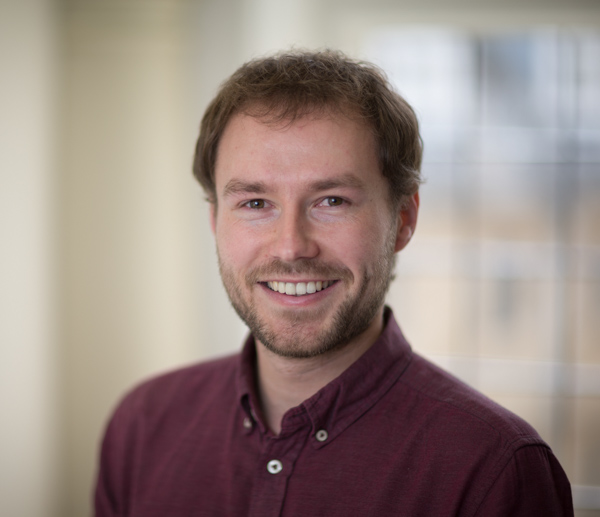
Professor, Department of Economics, University of Victoria
Bio:
Felix Pretis is an Assistant Professor in the Department of Economics at the University of Victoria, and co-director of the Climate Econometrics research project at Nuffield College at the University of Oxford. Prior to joining UVic, he was a British Academy Postdoctoral Research Fellow at the University of Oxford where he also completed his PhD in Economics, and a visiting researcher at UC Berkeley. His research concentrates on econometric methods applied to climate change and his work on the economic impacts of climate change featured in the IPCC special report on 1.5C.
November 12, 2020: IRES Student Seminar with Scott McKenzie and Nima Jamshidi
IRES Seminar Series
Time: 12:30pm to 1:30pm (every Thursday)
Via Zoom
View video.
*********************************************************************************
Advocates: Citizen engagement with the law to address water governance in Cape Town and Accra
This talk will discuss how those living and working in underserved areas of Cape Town, South Africa and Accra, Ghana perceived the links between water related concerns in their communities, law, and space. The talk will engage the fields of geography and legal studies and specifically to legal geography which lies at the intersection of these two disciplines. This will deepen an understanding of the reciprocal relationship between the use of space and law and the ways that these can co-create each other. The study in Cape Town and Accra draws on interviews with activists and legal professionals as well as on local, state, or international laws, regulations, and court filings. This talk will also help sketch the ways to conceptualize the legal landscape and mobilize resources to better address the needs in these communities. This resulted in a multi-sited and interdisciplinary examination of water governance, which should inform scholarly discussions about the role of law in water equality.
Scott McKenzie
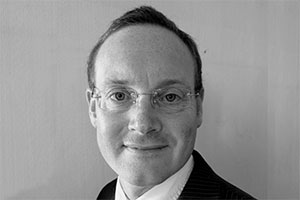
IRES PhD Program
Bio:
Scott is a PhD candidate in Resource Management and Environmental Studies working under the supervision of Dr. Leila Harris. Scott’s research and writing focuses on how contending notions of scale and regulation affect water policy (within the water-energy-food nexus). His work considers the relationship between the natural environment, human development, and law. He has also worked as a development agent for the United States Peace Corps in Morocco and as a lawyer.
Empirical Analysis of One-way Carsharing in Metro Vancouver
Vancouver is considered the one-way carsharing capital of North America. While very popular, especially with younger demographics, some key questions have lingered about the value of such services. Early research, mostly based on user surveys, suggested many benefits, such as significant reduction in private car ownership and better utilization of public transit infrastructure. But surveys are notorious for self-selection among respondents and aspirational answers to questions. We collected data about the actual use of vehicles from their open APIs for both Car2Go and Evo. We explored actual use patterns from over 5 million observations of vehicle locations and availabilities that can accompany the findings in the literature for better understanding and improving the one-way carsharing service.
Nima Jamshidi

IRES MSc Program
Bio:
Nima Jamshidi is a second-year Master of Science student at UBC under the supervision of Hadi Dowlatabadi at the Institute for Resources, Environment, and Sustainability (IRES). He holds a Bachelor of Science in Civil Engineering from the University of Tehran, where he focused on several projects from different fields, including Structural Finite Element Model Updating, and Water Resources Engineering. In order to broaden his knowledge about socio-ecological systems, he has joined IRES where he studies sustainable transportation, using data-driven analyses.
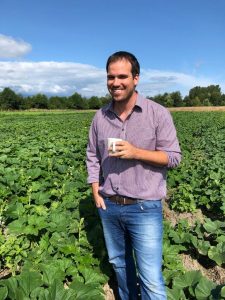 The IRES community is mourning the sudden passing of Adrian Semmelink, who did his Master’s with Kai Chan and Terre Satterfield from 2015-2018. Adrian was a warm, enthusiastic, empathetic person who seemed to set everyone at ease with his manner and his wonderful sense of humour. He brightened every room he walked in, and touched every person who came to know him. He made the world a better place through his research on sustainable agriculture and farmer practices, and through just being Adrian. We will miss him deeply and sorely.
The IRES community is mourning the sudden passing of Adrian Semmelink, who did his Master’s with Kai Chan and Terre Satterfield from 2015-2018. Adrian was a warm, enthusiastic, empathetic person who seemed to set everyone at ease with his manner and his wonderful sense of humour. He brightened every room he walked in, and touched every person who came to know him. He made the world a better place through his research on sustainable agriculture and farmer practices, and through just being Adrian. We will miss him deeply and sorely.